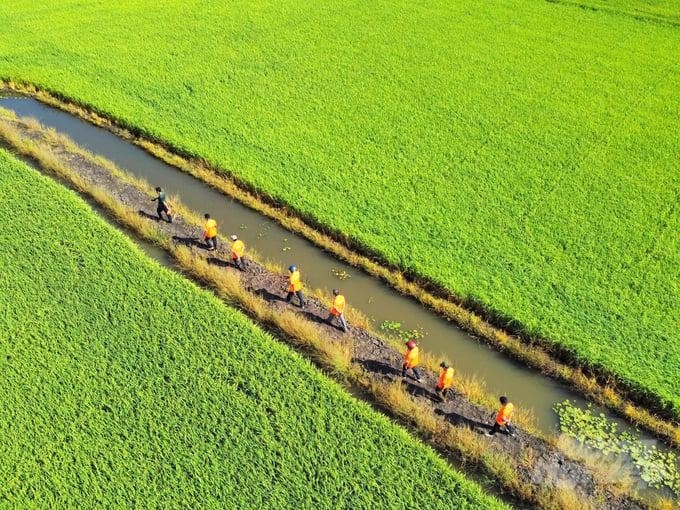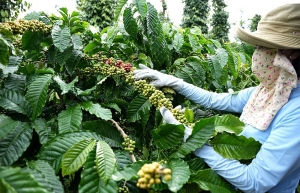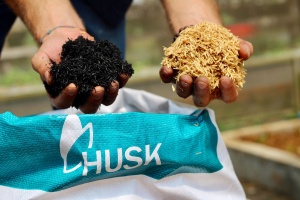Convergence awards grant to support regenerative agriculture in Lower Mekong
 |
According to Convergence on September 11, MERF is a $200 million blended finance vehicle that will provide growth-stage private equity funding focused on regenerative agriculture and sustainable land use business models in the Lower Mekong region. This grant is awarded through Convergence’s Asia Climate Solutions Design Grant.
The majority of the local population in the Lower Mekong region is dependent on agriculture and rural farming, making them severely and disproportionately affected by climate change.
Over the past decades, changing agricultural land use practices have led to increased exposure to climate hazards and increased GHG emissions from the agriculture, forestry, and land-use sectors. Meanwhile, private investments in the local sustainable agriculture and forestry sectors remain low and mainly take the form of debt, which is unsuitable for many businesses looking for patient long-term equity financing to support them in adopting more sustainable agricultural practices.
This initiative seeks to leverage Mekong Capital’s significant experience to address the gap of undersupplied equity funding in the region and support the expansion of impactful agri-businesses. In addition, MERF intends to provide hands-on support to investee companies through a complementary technical assistance facility that will help expand the operational capacity and impact for these companies.
MERF aims to cultivate a thriving, biodiverse ecosystem in the Lower Mekong region focusing on Cambodia, Laos, and Vietnam through sustainable land use, nature-based solutions, and regenerative farming practices. Together with climate mitigation benefits, it aims to provide significant co-benefits of improved livelihoods, climate adaptation, and enhanced resilience of farmers, and protection of biodiversity.
The long-term objective is to improve the livelihoods of at least one million beneficiaries, regenerate at least 200,000 hectares of forest, agricultural, and coastal land and contribute to over 10 million tonnes of CO2e emission reductions.
MERF received funding from the Dutch Fund for Climate and Development's Origination Facility for its initial design and to complete the feasibility study. This proof-of-concept grant from the ACS Design Grant will help Mekong Capital complete the final design of MERF, as well as the technical assistance facility and mobilise more sources of capital.
“Mekong Capital and Convergence’s partnership will accelerate the mobilisation of much-needed capital for climate adaptation and mitigation, while supporting farmers in the Lower Mekong region. Mekong Capital aims to lead the way in private sector investment and engagement in regenerative agriculture,” said Ellen Van, Mekong Capital's principal. “By leveraging blended capital to help private companies scale regenerative practices that replenish our natural assets and improve the lives of our farmers, MERF seeks to demonstrate that sustainable financial return and impact can co-exist."
Leah Pedersen, senior director of Market Acceleration and Design Innovation at Convergence said, "Mekong Capital’s Mekong Earth Regeneration Fund was selected due to its high potential for development impact, replicability in other sectors and geographies, and the team’s strong track record of engagement and regional presence."
“MERF is also a prime example of the field-building power of our funding. Through our grant, Mekong Capital, a mainstream private equity fund manager, will strive to enter the climate finance space for the first time.”
The ACS Design Grant targets critical climate mitigation and adaptation sectors in Asia including nature-based solutions, clean energy transition, and sustainable cities and infrastructure. It provides feasibility study and proof-of concept grants for innovative, high-impact and investible solutions using blended capital structures.
The ACS Design Grant is funded by four anchor donors: the Department of Foreign Affairs and Trade Australia, the Monetary Authority of Singapore, The Olayan Group, and UBS Optimus Foundation.
 | Nestlé supports farmers to advance regenerative agriculture More than one-third of global anthropogenic greenhouse gas (GHG) emissions come from agriculture, and the sector also accounts for 70 per cent of global freshwater withdrawals. Therefore, transitioning from traditional farming methods to low-emission, regenerative agriculture is considered one of the most important solutions to respond to climate change and contribute to the development of sustainable food systems. |
 | Mekong Enterprise Fund IV to invest $5 million in HUSK Mekong Enterprise Fund IV (MEF IV) has announced it has signed agreements to invest $5 million in HUSK, a pioneering biochar and biofertiliser company committed to regenerative agriculture practices in Southeast Asia. |
 | Choosing people, environment, and financial return for investors Mekong Capital is making a deeper foray into sustainability. Ellen Van, the fund’s investment principal, spoke to VIR’s Linh Le about how it assesses and manages risks, and the importance of authenticity in its sustainability endeavours. |
What the stars mean:
★ Poor ★ ★ Promising ★★★ Good ★★★★ Very good ★★★★★ Exceptional
Related Contents
Latest News
More News
- Trung Nam-Sideros River consortium wins bid for LNG venture (January 30, 2026 | 11:16)
- Vietnam moves towards market-based fuel management with E10 rollout (January 30, 2026 | 11:10)
- Envision Energy, REE Group partner on 128MW wind projects (January 30, 2026 | 10:58)
- Vingroup consults on carbon credits for electric vehicle charging network (January 28, 2026 | 11:04)
- Bac Ai Pumped Storage Hydropower Plant to enter peak construction phase (January 27, 2026 | 08:00)
- ASEAN could scale up sustainable aviation fuel by 2050 (January 24, 2026 | 10:19)
- 64,000 hectares of sea allocated for offshore wind surveys (January 22, 2026 | 20:23)
- EVN secures financing for Quang Trach II LNG power plant (January 17, 2026 | 15:55)
- PC1 teams up with DENZAI on regional wind projects (January 16, 2026 | 21:18)
- Innovation and ESG practices drive green transition in the digital era (January 16, 2026 | 16:51)

 Tag:
Tag:




















 Mobile Version
Mobile Version